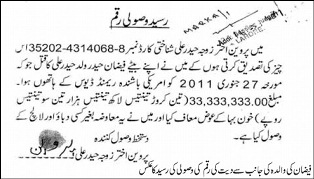 | ||||
|
The following is research published today from MEMRI’s Special Dispatch Series and the MEMRI TV Project.
Special Dispatch No. 3673—Turkey
Following Murder of Israeli Family, Turkish Columnist Writes in 'Hurriyet': 'You Shall Not Kill!'
In a March 15, 2011 column titled "You Shall Not Kill!" Turkish columnist Burak Bekdil contrasted Turkish Prime Minister Recep Tayyip Erdogan's "fits of anger towards the death of children," which Erdogan claims are "'indiscriminative' of race and religion," with his silence following the March 12 slaughter of the Israeli Fogel family by Palestinians. Bekdil added that a "Palestinian warrior" once told him, "For us, even a one-year-old Israeli baby is a soldier."
To read the full report, visit http://www.memri.org/report/en/0/0/0/0/0/0/5103.htm.
Special Dispatch No. 3671—Libya/U.S. and the Arab and Muslim World
Abd Al-Fattah Yunis, Former Libyan Interior Minister Who Joined the Rebels: Hillary Clinton Behaves As If She Were Al-Qadhafi's Secretary
Following are excerpts from an interview with former Libyan interior minister Abd Al-Fattah Yunis, who joined the rebels. The interview aired on Al-Arabiya TV on March 13, 2011.
To view this clip on MEMRI TV, visit http://www.memritv.org/clip/en/0/0/0/0/0/0/2860.htm.

Interviewer: "Are you in need of military aid in the form of equipment and weapons?"
Abd Al-Fattah Yunis: There have been offers from many friendly countries, and what we need, we take. We get significant aid from friendly countries and from Arab countries. The aid has begun to arrive." [...]
To read the full report, visit http://www.memri.org/report/en/0/0/0/0/0/0/5101.htm.
Special Dispatch No. 3672—South Asia Studies Project/Pakistan
Countrywide Protests in Pakistan after Release of CIA Contractor Raymond Davis
Protests erupted in towns across Pakistan after Raymond Davis, the CIA contractor whose arrest on double murder charges in Lahore threatened to sink Pakistan-U.S. relations, was released on March 16 under an agreement for blood money.
Soon after the release, protesters led by various religious and political organizations such as the Jamaat-e-Islami Pakistan, Pakistan Tehreek-e-Insaf party, Pasban (a religious-political pressure group), turned out in Pakistani streets and outside the U.S. Embassy and consulates to register their anger over Raymond Davis's release. More anti-U.S. protests are expected in Pakistan in coming days over the issue:

A part of the document for diyat (blood money) signed by the relatives of Faheem and Faizan, the two victims of Raymond Davis, and produced in the Pakistani court. In the above image, Parveen Akhtar, mother of Faizan, signed the agreement stating that she received 33,333,333.00 Pakistani Rupees without any greed or coercion. (Image courtesy: Roznama Jang, Pakistan, March 17, 2011)
To read the full report, visit http://www.memri.org/report/en/0/0/0/0/0/0/5102.htm.
Special Dispatch No. 3670—South Asia Studies Project/Pakistan
Editorials in Pakistani Dailies Warn of Expanding Middle Eastern War

Protests in Bahrain. Pakistani newspapers fear that Bahrain protests could herald a larger Shia-Sunni sectarian war in the Middle East
In a series of editorials, Pakistani newspapers have expressed concern that a move by the U.S.-led international community to impose no-fly zone over Libya and order a military intervention could prove to be counter-productive and lead to the widening of war in the Middle East. Various Pakistani dailies also criticized the decision of the Gulf countries to send troops into Bahrain to quell the Shia protesters and save the Sunni regime.
In an editorial titled "Libyan Struggle," the Dawn newspaper expressed opposition to a Western military intervention in Libya, warning that as a result of such a move the anti-Qadhafi uprising could fizzle out. In an editorial titled "Middle Eastern Stability," The Express Tribune daily warned that the "conflict in Bahrain threatens wider Middle Eastern stability" and that Bahrain could become the site of a proxy war between Iran and other players.
In an editorial titled "Bahrain Tensions," The News daily noted that the uprising in Bahrain is turning into a Shia-Sunni sectarian conflict, with the Sunni Saudi Arabia and the Shia Iran having strong interests in the outcome of the uprising. It also argued that if a pro-Iranian regime were to come to power in Bahrain, the U.S. will lose its strategic naval dominance over Iran in the Gulf waters.
The Lahore-based Daily Times newspaper, in an editorial titled "Foreign Interventions in Bahrain and Libya," noted that security forces hired by the ex-soldiers of Pakistan Army are being deployed in Bahrain to quell the Shia protesters. In an article titled "Meddling in Bahrain's Internal Affairs," Karachi-based journalist Nadir Hassan examined the Pakistan Army's role in sustaining regimes in the Middle East over the past several decades and cautioned against such a move, arguing that such previous Pakistani roles have harmed Pakistan's foreign policy interests in the region.
To read the full report, visit http://www.memri.org/report/en/0/0/0/0/0/0/5100.htm.





















